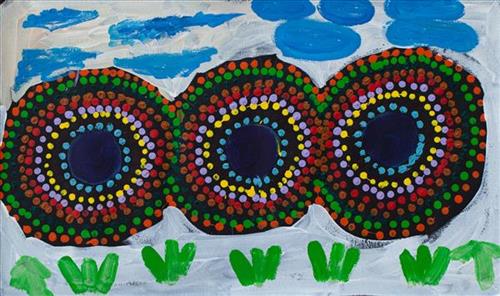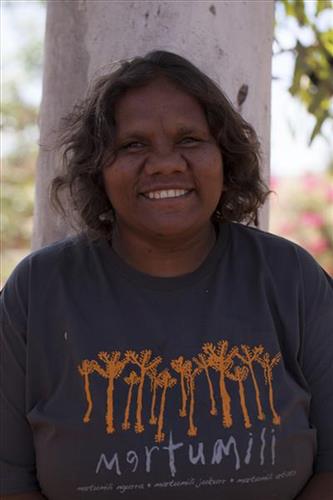Biography:
"My name is Judith Samson. My skin [group] is Milangka and I speak Martu Wangka. I was born in Hedland, Port Hedland seaside, but I moved to Jigalong community with my nanna [Dadda Samson (dec.)] and my pop. Then we moved to desert, to Puntawarri, [Canning Stock Route] Well 17. I was still a young girl, still crawling in the desert. It was nice there. Some other families lived there with us. We had some farm, some vegetables. We went schooling in Puntawarri at the school, learning ‘two way’ [refers to teaching in both Martu Wangka and English, with a focus on local cultural and ecological knowledge]. We used to go and get some parnajarrpa (goanna) and turkey. We had a Toyota truck. We been go hunting at the desert. Some people there still, but they gotta build some new houses and then we going back to [live in] Puntawarri.
My nanna’s sister had a house here in Newman, so we used to come and visit. I did high school here in Newman. Now I move between Jigalong and Newman. My nanna [was] living in Jigalong, so I still go visit there.
I started to do painting here at Martumili when I was a young girl. I been help my nanna painting, we were painting Puntawarri one. My nanna was teach me to paint. I like to do some painting. I paint the Canning Stock Route, [and Canning Stock Route] Well 17 at Puntawarri. My favourite thing is going out to Country, and go back to Jigalong and Puntawarri, and to do some painting about Country. Painting helps me be strong. My family and my culture is feeling proud. I feel happy when I paint- pukurlpa. Happy! I also like playing softball. We play for Jigalong, Western Desert. I also like to dance and listen to music.
I work with Martumili now. I come to work and wash all the paint, put all the tubs in the colour and wash all the brushes. I help sell the paintings, and photograph and catalogue them. I went to America, Fremantle, the Gold Coast, Sydney, and Alice Springs with Martumili. I like to work at Martumili- happy, pukurlpa (happy). I also work for KJ (Kanyirninpa Jukurrpa ranger group) mob in Jigalong too."
- Judith Anya Samson
Judith is the granddaughter of Dadda Samson and Yanjimi (Peter) Rowlands, both of whom were highly regarded Martumili artists. She was born in Port Hedland and has lived most of her life in Jigalong. Judith was raised by her grandparents Dadda and Yanjimi, as her parents passed away when she was very young. As Judith describes, she was taught to paint by her grandmother Dadda, who passed stories to her for painting. Judith also spent much time travelling with Dadda to her country around the Puntawarri and the Rabbit Proof Fence areas, both subject of many of her paintings.
Judith has exhibited in most Martumili Artists' exhibitions in recent years. Her work has been acquired by the Art Gallery of Queensland (GOMA) and the National Museum of Australia.




